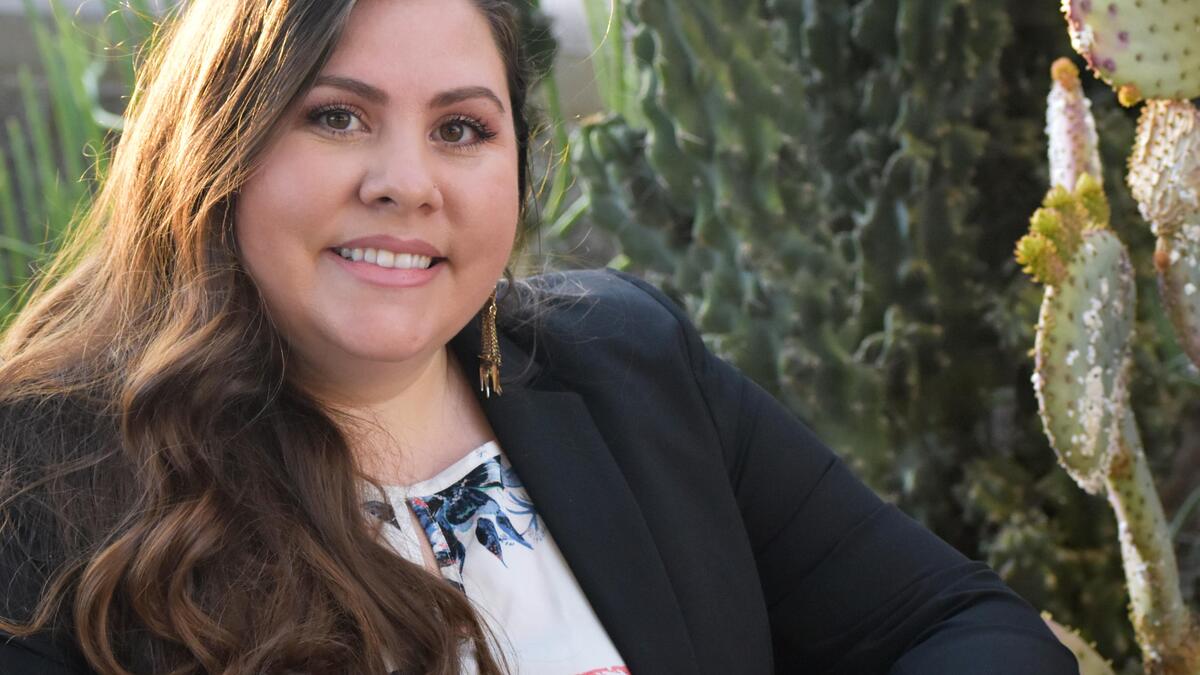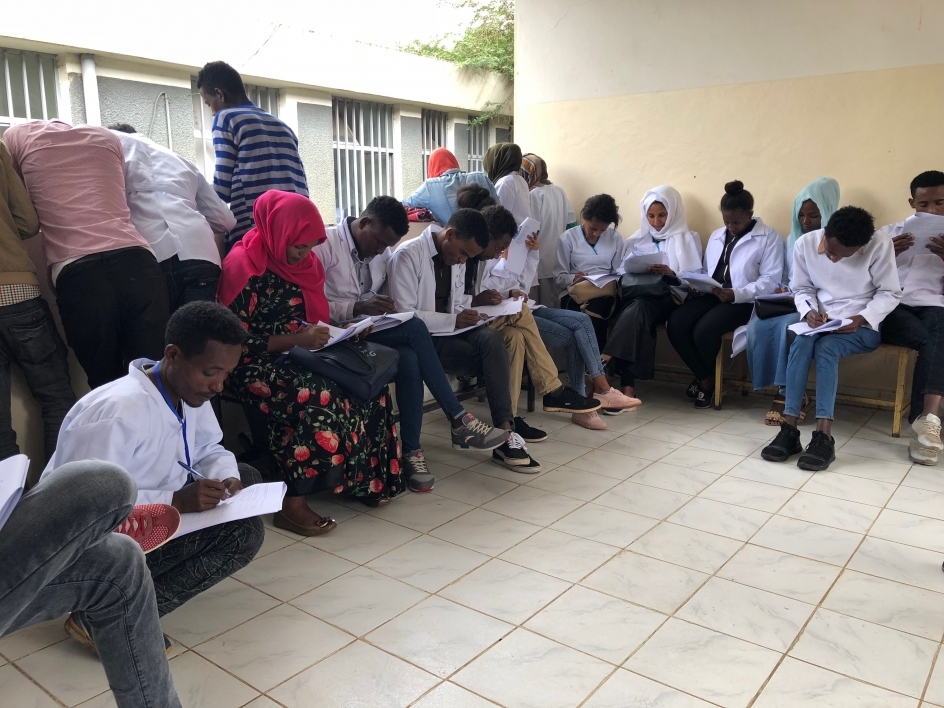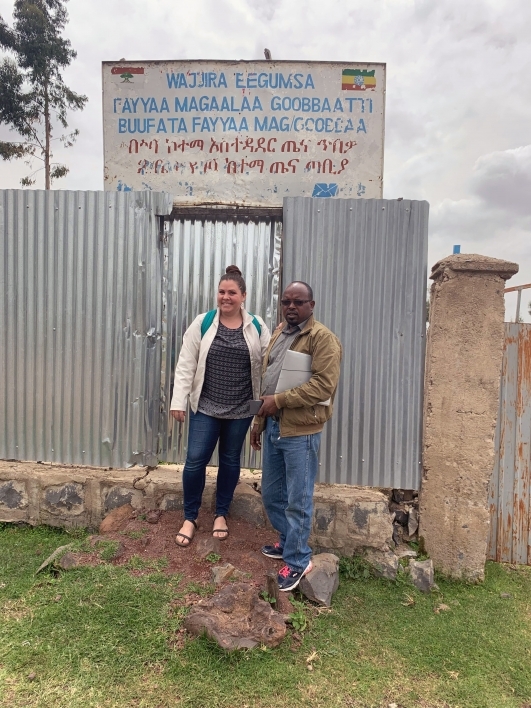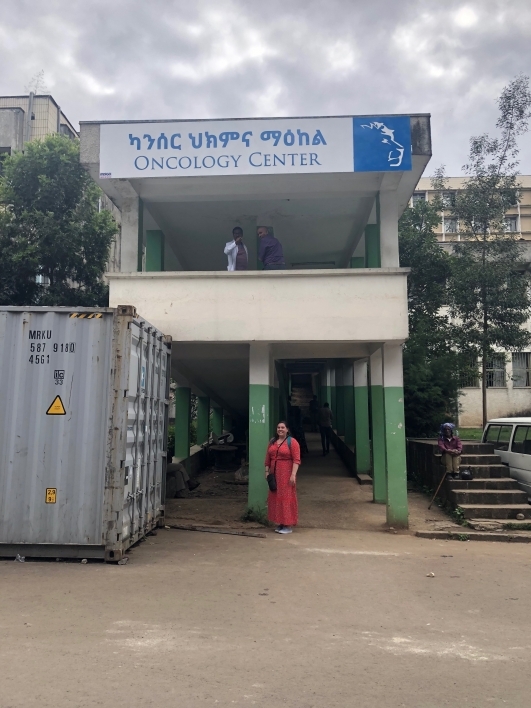ASU alumna analyzes cervical cancer awareness in Ethiopia

Photo courtesy of Breanne Lott.
A love of foreign cultures and a desire to help others inspired an Arizona State University global health alumna to study cervical cancer in sub-Saharan Africa.
Breanne Lott, a 2012 School of Human Evolution and Social Change graduate, recently won the PEO Scholar Award for the potential to make a positive impact through her research.
Her dissertation evaluates cervical cancer prevention efforts in Ethiopia. Lott notes cervical cancer disproportionately affects African women, and east Africa has the highest incidence and mortality rates in the world. Lott attributes this to many factors including the high prevalence of HPV in the region and comorbidity with HIV, low access to cancer treatment, and low use of preventive screening.
Lott was inspired to pursue research in cervical cancer after spending two years in Ethiopia as a Peace Corps volunteer from 2012 to 2014. She worked in a health office where she focused on HIV education in her local community. Lott also served on the Gender Development Committee, hosting open discussions about gender equality and equity.
“I had the opportunity to work with some amazing women living with HIV and was keenly aware of the way that gender increased women's risk for HIV,” Lott said.
After her time with the Peace Corps, Lott received the Cancer Epidemiology Education in Special Populations Fellowship to return to Ethiopia and conduct cervical cancer research for her doctoral dissertation in 2019.
Cancer screenings rarely discussed
The main components of Lott’s research are a literature review to better understand women’s current screening behavior, implementing a Cervical Cancer Awareness Measure questionnaire to be used by health care providers, and interviews with cervical cancer experts to explore barriers to cancer screening in Ethiopia.
The first component, recently published in BMC Public Health, described cervical cancer screening interventions throughout sub-Saharan Africa. Lott focused on 19 studies that outlined ways to get more women to participate in preventive screenings. Methods included educational awareness campaigns, text message reminders, offering vouchers for transportation services to doctors’ offices and lottery-style games for earning screening subsidies.
With an established framework of past efforts to increase screenings, Lott was well-prepared for fieldwork in Africa. When she returned to Ethiopia from May to August 2019, she administered a questionnaire to 772 health providers at eight health facilities in the Oromia region, which spans southwest Ethiopia. The health providers included physicians, nurses, health extension workers and medical students.
Preliminary findings suggest that health professionals understand cervical cancer but rarely talk with patients about screenings. Lott said more than 90% of the survey-takers could identify six of the 11 warning signs, as well as six of the 11 risk factors. Less than 10% of providers reported having asked their female patients if they have ever been screened for cervical cancer and less than 20% of female providers had been screened themselves.
Understanding barriers to screening
Cervical cancer can be prevented with early screening, so a goal of Lott’s research is to figure out why screening uptake is low in Ethiopia. Cultural norms are one important barrier. Lott notes that some women may not seek cervical cancer screening because they feel shy or embarrassed about the cervical exam. It is also a common belief in Ethiopia that cancer is a death sentence because many women who have had cervical cancer were diagnosed late, having sought care only after clear symptoms disrupted daily life.
Lott worked with a team to translate the Cervical Cancer Awareness Measure questionnaire, created in the United Kingdom, into local languages Amharic and Afan Oromo. She found it interesting how different parts of the world describe cervical cancer risk factors.
For example, Lott said the U.K. version cited a risk of “having a sexual partner with multiple sexual partners” but the Ethiopian version used “polygamy marriage” instead.
“These culturally relevant terms could be important to include in provider training and any future iterations of a cervical cancer awareness measure for the Ethiopian context,” Lott said.
Setting the stage for a global health career
Lott is now completing her doctorate at another prestigious university, but she noted several special experiences from her undergraduate program at ASU.
“I had two particular experiences that were really informative for me,” Lott said. “I was able to study abroad, and I was involved in several research projects as an undergrad.”
As a requirement of the global health major, Lott completed a six-week internship at a biology lab in Paraguay.
“That was the first time I was outside the U.S. for an extended period of time and I just fell in love with it,” Lott said. “It was a great opportunity to interact with people who were different from me, and the biology lab experience supplemented everything I was learning in my global health classes.”
Another foundational experience was participating in active research projects.
“I had the opportunity to be involved in several projects as an undergrad, and at the time I didn’t understand how unique that was,” Lott said. “Now, having gone through a master's and doctorate program, where you’re kind of starved for research opportunities, I look back and realize that was something really amazing that (the School of Human Evolution and Social Change) was able to offer for undergraduates.”
As an undergraduate student, Lott collected and entered data for the school’s long-running global ethnohydrology study. She, alongside other students and ASU researchers Alissa Ruth and Melissa Beresford, worked with local children, asking them to draw pictures of their environments now and again in 100 years. The research team then used qualitative coding to analyze the drawings, determining what kids think about water security in Phoenix.
Lott also studied diabetes in Guatemala with Associate Professor Jonathan Maupin and worked with a graduate student studying tuberculosis in Paraguay. “It was a really enriching experience for me,” Lott said.
What’s next
Lott expects to complete her doctorate in health sciences promotion next May with the support of the PEO Scholar Award. It is given to women in doctoral programs to supplement costs associated with research. For the academic year 2020-21, there were 900 nominations and 100 awards given.
In the future, Lott hopes to continue global health and cancer research, either in an academic setting or at a government institution like the National Cancer Institute. She sees the need for increased access to women’s health care, not just in Ethiopia, but in surrounding African countries as well.
“Sub-Saharan Africa as a region experiences disproportionate cervical cancer burden,” Lott said. “I'm especially interested in studying HPV self-sampling as a community-based strategy as I continue my own research agenda in the future since it can reduce some environmental and access issues that prevent women from screening.”
More Arts, humanities and education

Local traffic boxes get a colorful makeover
A team of Arizona State University students recently helped transform bland, beige traffic boxes in Chandler into colorful works…

2 ASU professors, alumnus named 2025 Guggenheim Fellows
Two Arizona State University professors and a university alumnus have been named 2025 Guggenheim Fellows.Regents Professor Sir…

No argument: ASU-led project improves high school students' writing skills
Students in the freshman English class at Phoenix Trevor G. Browne High School often pop the question to teacher Rocio Rivas.No,…




